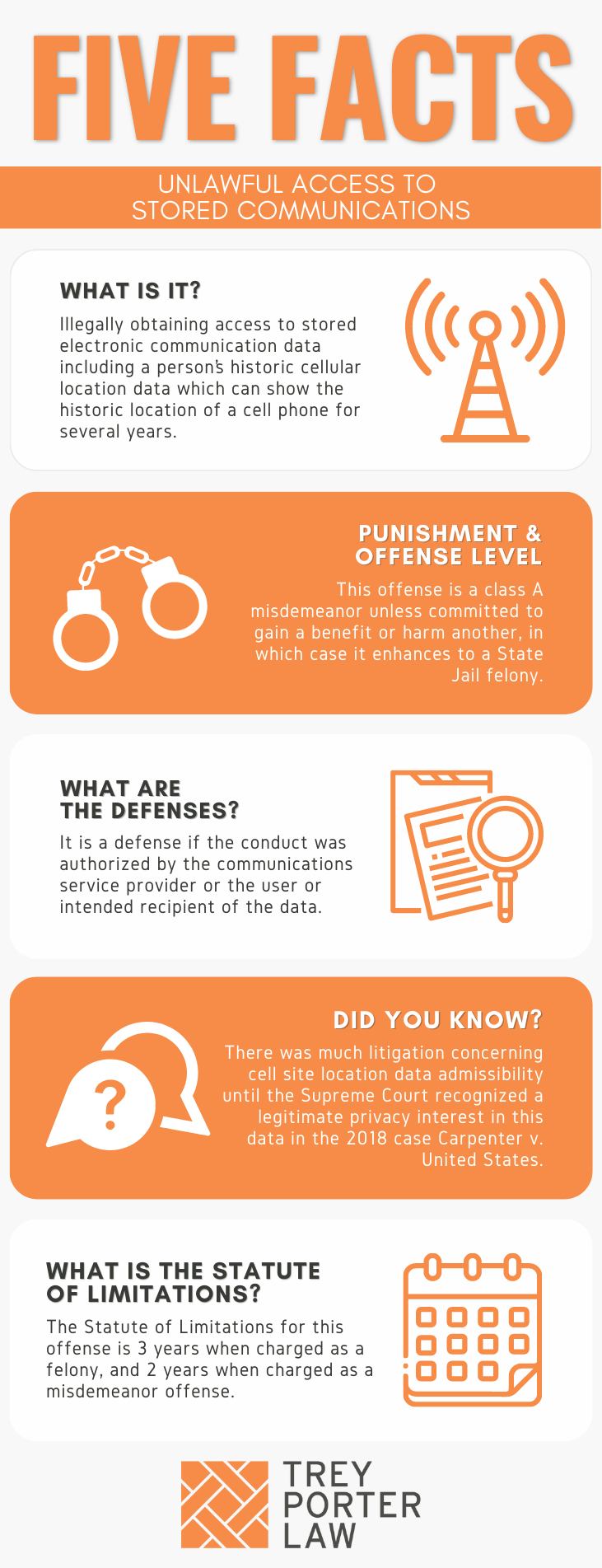WHAT IS UNLAWFUL ACCESS TO STORED COMMUNICATIONS IN TEXAS?
A person unlawfully gains access to stored communications by obtaining, without legal authorization, another’s historical cell site location information (CSLI), which shows the location of a cell phone dozens of times a day up to five years in the past.
WHAT IS THE UNLAWFUL ACCESS TO STORED COMMUNICATIONS LAW IN TEXAS?
Tex. Penal Code § 16.04. UNLAWFUL ACCESS TO STORED COMMUNICATIONS.
(b) A person commits an offense if the person obtains, alters, or prevents authorized access to a wire or electronic communication while the communication is in electronic storage by:
(1) intentionally obtaining access without authorization to a facility through which a wire or electronic communications service is provided; or
(2) intentionally exceeding an authorization for access to a facility through which a wire or electronic communications service is provided.
(c) Except as provided by Subsection (d), an offense under Subsection (b) is a Class A misdemeanor.
(d) If committed to obtain a benefit or to harm another, an offense is a state jail felony.
(e) It is an affirmative defense to prosecution under Subsection (b) that the conduct was authorized by:
(1) the provider of the wire or electronic communications service;
(2) the user of the wire or electronic communications service;
(3) the addressee or intended recipient of the wire or electronic communication; or
(4) Chapter 18B, Code of Criminal Procedure.
WHAT IS THE PENALTY CLASS FOR UNLAWFUL ACCESS TO STORED COMMUNICATIONS IN TEXAS?
Unlawful access to stored communications is a Class A misdemeanor, punishable by up to one year in county jail. If, however, a person unlawfully accesses another’s stored communications to obtain a benefit or to harm another, it is a state jail felony, punishable by 180 days to two years in a state jail facility.
WHAT IS THE PUNISHMENT RANGE FOR UNLAWFUL ACCESS TO STORED COMMUNICATIONS IN TEXAS?
The punishment range for the unlawful access to stored communications charged as a Class A misdemeanor is up to a year in jail, and a maximum fine of $4,000. State jail felony unlawful access to stored communications carries a possible 180 days to two years in a state jail facility, and up to a $10,000 fine.
WHAT ARE THE PENALTIES FOR UNLAWFUL ACCESS TO STORED COMMUNICATIONS IN TEXAS?
As an alternative to confinement, a person may be eligible for probation after a conviction, or deferred adjudication without a conviction. The maximum period of community supervision is two years for a Class A misdemeanor, and between two and five years for a state jail felony.
WHAT ARE THE DEFENSES TO UNLAWFUL ACCESS TO STORED COMMUNICATIONS IN TEXAS?
The unlawful access to stored communications statute creates affirmative defenses that, if successfully proved, will lead to an acquittal. One’s access to stored communications is lawful if it was authorized by:
- the provider of the wire or electronic communications service;
- the user of the wire or electronic communications service;
- the addressee or intended recipient of the wire or electronic communication; or
- Chapter 18B of the Code of Criminal Procedure.
WHAT IS THE STATUTE OF LIMITATIONS FOR UNLAWFUL ACCESS TO STORED COMMUNICATIONS IN TEXAS?
The limitation period for unlawful access to stored communications categorized as a Class A misdemeanor is two years. If it is a state jail felony, the limitation period is three years.
UNLAWFUL ACCESS TO STORED COMMUNICATIONS IN TEXAS
People have a reasonable expectation of privacy under the Fourth Amendment in their historical cell site location information. While cell phone carriers may monitor and store this data for finding weak spots in their network, or applying roaming charges, neither the government nor any other individual may access the precise, time-stamped location and individual identifying information without prior legal authorization for a legitimate purpose.
TEXAS UNLAWFUL ACCESS TO STORED COMMUNICATIONS COURT CASES
The case law regarding unlawful access to stored communications in Texas shows the recognition of citizens’ privacy interests. The Texas Court of Criminal Appeals has ruled that a person has a reasonable expectation of privacy in his CSLI.
- In Holder v. State, the defendant was convicted of capital murder, and the police illegally obtained his CSLI for 23 days surrounding the murder. He was convicted, which was ultimately affirmed, but not without the determination that the CSLI should not have been admitted into evidence at trial. Absent exigent circumstances or some other recognized law enforcement need, police need a warrant based on probable cause to access seven or more days of CSLI information.Holder v. State, 595 S.W.3d 691 (Tex. Crim. App. 2020).

















